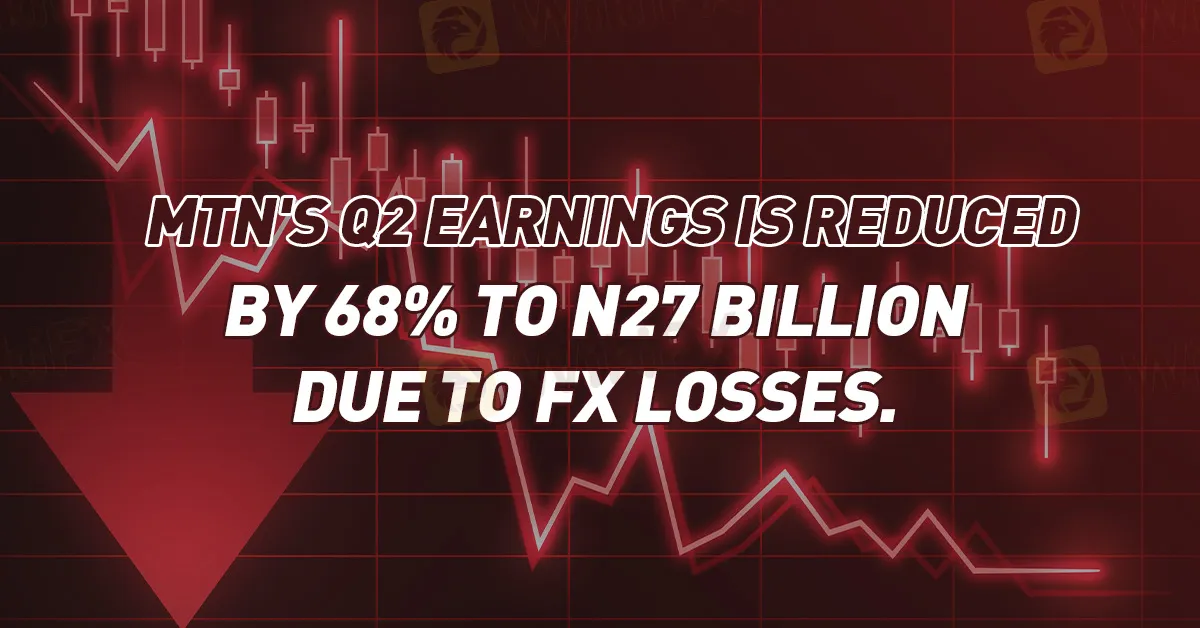简体中文
繁體中文
English
Pусский
日本語
ภาษาไทย
Tiếng Việt
Bahasa Indonesia
Español
हिन्दी
Filippiiniläinen
Français
Deutsch
Português
Türkçe
한국어
العربية
MTN'S Q2 EARNINGS IS REDUCED BY 68% TO N27 BILLION DUE TO FX LOSSES.
Abstract:The second quarter (Q2) of MTN Nigeria Plc was marred by a foreign currency (FX) loss of N126.8 billion, which reduced the period's after-tax earnings by 67.7% year over year to N27.4 billion. The amount is more than 10 and a half times greater than the N12 billion FX loss from the same quarter last year.

The second quarter (Q2) of MTN Nigeria Plc was marred by a foreign currency (FX) loss of N126.8 billion, which reduced the period's after-tax earnings by 67.7% year over year to N27.4 billion. The amount is more than 10 and a half times greater than the N12 billion FX loss from the same quarter last year.
The second quarter accounts for the majority of the N131.5 billion FX loss that the telecommunications business announced at the end of its half-year operations.
The FX loss changed the company's earnings reading from a 19.7% increase in operating profit at half-year to a drop of 25.4 percent in pre-tax profit to N200.4 billion for the six months of trading, a drop of more than N68 billion, according to report for the six months ended June 2023.
In addition to the pressure from FX losses, rising interest costs on the company's sizable borrowings and leases pushed overall finance costs up more than two and a half times year over year to N237.6 billion.
Over the course of six months, the number of borrowings and leases on the balance sheet increased by N116 billion, totaling over N1,187 billion.
The Q2 led year-over-year rise of the same at 259.8%, accounting for N182 billion, or 76.6 percent, of the cost of finance at the year.
Other than the setback of FX losses and increased finance expenses, MTN Nigeria has managed growth so far this year despite the pressure from operating costs.
The business ended its half-year operations with a N1,158.7 billion turnovers, an increase of 22%. Voice service revenue came in slightly higher than data service revenue at N474 billion compared to N469.4 billion.
However, data service revenue increased at a pace of 34.8 percent compared to 13.6 percent, more than 2.5 times faster than phone service revenue.
As a result, revenue from data services has grown even more, contributing an additional N40.5 billion at 2023, up from N21 billion in 2021, or 38 percent of overall revenue.
All of the company's income streams with digital services growing by 52.6 percent to N17.4 billion and SMS registering a robust 40 percent gain to N41.7 billion.
Although the company's management is not allowing costs to increase as quickly as they did in 2022.
The primary cost line, direct network operating cost, increased by 28.3 percent to about N277 billion at the halfway point of the year, outpacing revenue. The operational cost margin dropped to 36.4 percent during the time, result of that and other escalating costs making an inroad into revenue.
As a result, operating profit increased 19.7% less quickly than revenue for a half-year total of N421.6 billion. Nevertheless, this still implies an increase in operational profit for the time period of N69.3 billion.
The increase in finance costs, which rose from N90.7 billion in the same time last year to N237.6 billion at half year, offset the gain in operating profit and finance income of N16.4 billion.
The fiscal year, finance costs accounted for 56.4% of operating profit, up from 25.8% in the same period the previous fiscal year.
For the first six months of operations, pre-tax earnings decreased by N68.2 billion, or 25.4 percent, to N200.4 billion, while after-tax profit fell by 29 percent to N128.7 billion.
The business's after-tax earnings increased by 28% to N181.6 billion over the same time. The net profit margin decreased from 19.1% in the same period in 2022 and from 17.8% at year's end to 11.1 percent in the first half of 2023.
From 45.5 percent the year before, in 2021, to 20.2 percent the following year, to conclude at N359 billion at the end of 2022, profit growth dropped last year. The decline in the current fiscal year is a result of the ongoing slowdown.

Disclaimer:
The views in this article only represent the author's personal views, and do not constitute investment advice on this platform. This platform does not guarantee the accuracy, completeness and timeliness of the information in the article, and will not be liable for any loss caused by the use of or reliance on the information in the article.
Read more

Gold Breaks $3,300 Barrier—Time to Celebrate or Caution?
Gold hits record high—rally or risk ahead?

Why Trade Agreements Matter to Nations
In today’s interconnected world, trade agreements serve as the foundation for stable and predictable international commerce.

Trade Fights Are Heating Up—What Happens Next?
Global financial markets have become increasingly reactive to even minor developments in international trade talks.

Juno Markets Upgrades to FYNXT PAMM
Juno Markets has successfully upgraded its managed account infrastructure by integrating FYNXT’s Percent Allocation Management Module (PAMM) system.
WikiFX Broker
Latest News
eXch Exchange to Shut Down on May 1 Following Laundering Allegations
How a Viral TikTok Scam Cost a Retiree Over RM300,000
JT Capital Markets Review
FCA Proposes Simplifying Investment Cost Disclosure for Retail Investors
Fresh Look, Same Trust – INGOT Brokers Rebrands its Website
Beware of Gold Bar Investment Scams: Rising Threats
SEC Warns of Love Scams and Pig Butchering Investment Schemes
Finalto Teams Up with Alphaville for 2025 London Quiz
Think Scams Won’t Happen to You? That’s Exactly What Scammers Count On
Elites Gather in Taipei to Forge a New Forex Ecosystem
Currency Calculator


